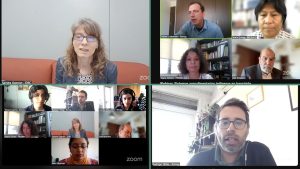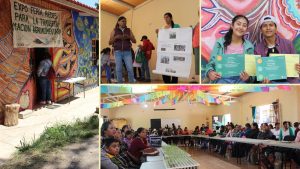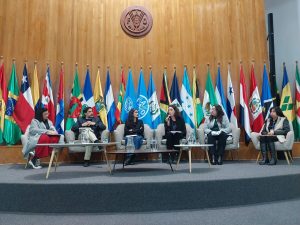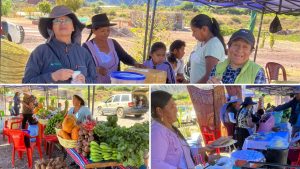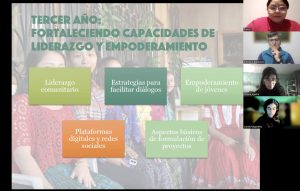The closing event of the "Networks for Agrifood Transformation" project offered a space for dialogue on the projections and challenges...
Between the desire to act and the reality of achieving the objective: indigenous rural youth and agroecology
New Rimisp paper explores the tensions limiting the adoption of agroecology by rural indigenous youth in Mexico, Guatemala and Bolivia.

The Working Paper No. 295 entitled “Between the desire to act and the reality of achieving the objective: Tensions of Indigenous Rural Youth regarding Agroecology”.The study, carried out in Sierra Norte Puebla (Mexico), Alta Verapaz (Guatemala) and Torotoro (Bolivia), presents the challenges that the new generations identify in implementing agroecological practices in their territories. The study, conducted in the Sierra Norte de Puebla (Mexico), Alta Verapaz (Guatemala) and Torotoro (Bolivia), identifies four critical problem areas that hinder the transition to sustainable and inclusive food systems.
Problem area 1: Between healthy and ecological agriculture and the widespread use of agrochemicals.
Young people value chemical-free production for its environmental and human health benefits. However, in their communities, the use of agrochemicals predominates to ensure yields and reduce labour, despite their economic costs and soil depletion.
“Farmers use agrochemicals because it makes it easier for them, because they have the mentality of using agrochemicals on their land and not trying to use organic products. Maybe they think they doesn’t work.”
(Young woman, Sierra Norte de Puebla, Mexico).
Problem area 2. Wanting to learn new techniques and not being able to implement them.
There is a strong interest in learning agroecological techniques (traditional and innovative), but young people lack access to land and autonomy to apply them. Many depend on family land where decisions are made by older generations.
“The other thing is that young people don’t have land. Sometimes their parents sell them and the young people are left without land. So, there is nowhere to go to practice, nowhere to plant.” (Young man, Alta Verapaz, Guatemala)
Problem area 3: Valuing traditional food and eating packaged food.
Young people rescue traditional foods for their nutritional and cultural value, but face generational changes in diets, with an increase in the consumption of packaged food. This is aggravated by water scarcity and labour migration.
“… the generations no longer want to eat what they used to, now they only eat sausages, which is what hurts you the most and some people have developed stomach cancer because of all that.”
(Young woman, Sierra Norte de Puebla, Mexico).
Problem area 4: Benefits of agroecology at family level and disenchantment with traditional peasant and indigenous life.
Although they recognize the benefits of agroecology for self-consumption and the family economy, some doubt its viability on a large scale. In addition, they believe that their peers perceive agriculture as a “step backward” in the face of harsh living conditions and off-farm labour aspirations.
“(The young people) think that if they go back to agriculture it is as if they are going backwards and not advancing, and that is why they want to leave here from the community and want to go to the city.”
(Young man, Torotoro, Bolivia).
The study was based on qualitative methodologies such as photovoice (images and narratives) and semi-structured interviews with 22 indigenous youth, participants in leadership workshops. All of them maintain strong territorial roots and an interest in agriculture, but face realities marked by poverty, youth migration and the effects of climate change.
The text highlights the need for policies that address access to land, inclusion of youth and innovative approaches to make agroecology viable for younger generations.
The study was conducted within the framework of the Networks for Agri-Food Transformation projectimplemented by Rimisp – Latin American Center for Rural Development Rural together with local partners from CESDER-PRODES in Mexico, APROBA-SANK in Guatemala and PROSUCO in Bolivia, and was made possible thanks to funding from the International Development Research Center (IDRC) of Canada.
The working document is available here: Between the desire to act and the reality of achieving the objective. Tensions of indigenous rural youth regarding agroecology.
News
Project News
Mexico: Rimisp and Cesder hold closing event for the Networks for Agri-Food Transformation project
A community expofair was held with Nahuatl communities in the Sierra Norte de Puebla and field visits were made to...
In order to transform the territories, communities must be listened to
Rimisp presented at an international seminar celebrating 10 years of the "Small Localities" program in Chile.
Country News
Rimisp webinar addresses the future of indigenous food systems
The closing event of the "Networks for Agrifood Transformation" project offered a space for dialogue on the projections and challenges...
Successful 1st Agroecological Productive and Healthy Food Fair in Torotoro, Bolivia
The event, held as part of the Networks for Agrifood Transformation project, took place in the Rancho Pampa community.
Rimisp concludes cycle of workshops with indigenous youth from Mexico, Guatemala and Bolivia
About 15 young people participated in the third and last cycle of virtual workshops that took place between May 7...
Subscribe
Our offices:

- Chile: Huelén 10, Providencia, Santiago, Metropolitan Region (+56-2) 2236 4557 | Fax (+56-2) 2236 4558.

- Ecuador: Czechoslovakia E9-95 between Switzerland and Moscow. Eveliza Plaza Building. First floor. Quito. (+593-2) 5150144.

- Colombia: Carrera 9 No 72-61 Office 303. Bogotá. (+57-1) 2073 850.
